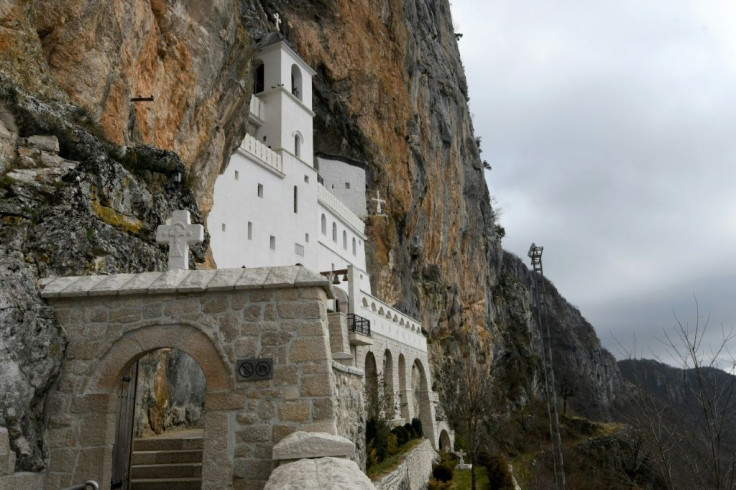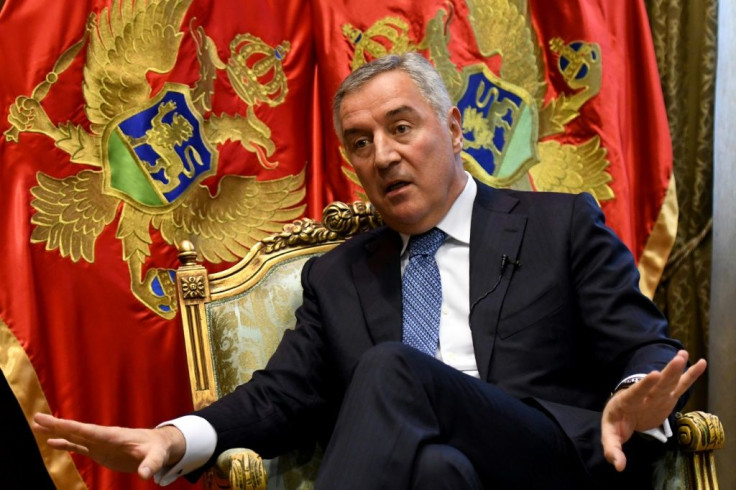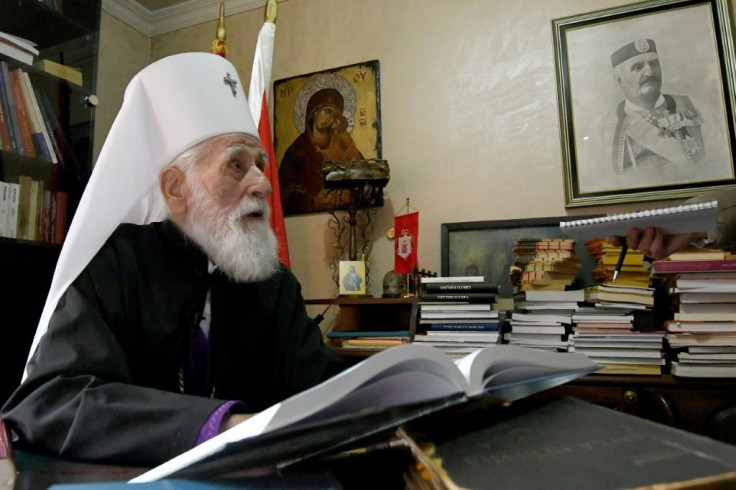Holy Row: The Battle Over Montenegro's Orthodox Faith

Pressed into a rocky cliff-face in the heart of Montenegro, the Ostrog monastery welcomes Orthodox pilgrims to its tranquil sanctuary above a vista of rolling hills and tiny villages.
But the peaceful setting belies the religious turmoil that has divided the small Balkan state beneath.
Priests and their followers have been taking to the streets for weeks, accusing the government of planning to steal their holy relics and handsome assets through a new law that could turn many of their churches, including Ostrog, into state property.
The government, however, insists it is only trying to claim what is rightfully Montenegrin: the hundreds of monasteries that are still run by the Serbian Orthodox Church (SPC), even though Montenegro declared independence from Serbia in 2006.
The controversy has brought sensitive debates about identity, nationality and religion to the surface in Montenegro, a tight-knit country of 620,000 wedged in between rugged mountains and the Adriatic sea.
President Milo Djukanovic, who led Montenegro's separation from Serbia, says the Serbian church's lingering influence is undermining his country's 14-year independence.
But the government's involvement in religious affairs has outraged clergy and many believers in a country where nearly three quarters follow the Orthodox faith.
High up inside the halls of Ostrog, Father Jovan Radovic expresses fears that the government wants a cut of the cash left by hundreds of thousands of pilgrims who visit the popular monastery for its purported healing powers.
"We think it's something political, and something concerning the money that passes here," he said of the new law passed late December.
Under the legislation, religious communities must prove ownership of properties from before 1918 in order to keep them. The rest will go to the state.

A core fear of the SPC clergy is that the government plans to transfer their sacred sites to an independent Orthodox Church in Montenegro that would not answer to Belgrade.
"The first problem with the law is that a president of a country who is not baptised is going to create a new church," Father Radovic said from Ostrog. "It's incredible".
President Djukanovic is open about his desire to build an autonomous Orthodox Church in Montenegro -- similar to Ukraine's split from Russia.
In reality, however, he has a long way to go.
An independent Montenegrin church was declared in the 1990s but it still pales in comparison to its Serbian big brother.

It has only 40 sites of worship and no more than 20 priests, compared to the SPC's 650 churches on Montenegrin land.
The Montenegrin church has also not been recognised by the world's major Orthodox power centres, denting its credibility.
But its 82-year-old leader, Bishop Mihajlo Dedeic, hopes the new law will be "positive" for his flock.
Sporting long robes and wispy white beard, the affable Bishop works out of a modest house in the central town of Cetinje, where the SPC also bases its Montenegro branch in a sprawling stone monastery down the road.
"By returning the monasteries and churches to the state of Montenegro, we will establish some other avenues for the two Orthodox churches to resolve the property issues," Dedeic told AFP, saying he hoped a "compromise" could be reached for both churches to share the houses of worship.
Like many Balkan disputes, the church rivalry stretches far back into history.
In this case, it is a disagreement about the status of the Orthodox faith a century ago.
Was there an autonomous Montenegrin church before 1918, when the country fused with Serbia?
Or was the church there always an extension of the Serbian Orthodox Church, as SPC clergy insist?
"To be frank there is no way we can determine that," said Emil Hilton Saggau, a PhD student at the University of Copenhagen who has researched the topic extensively.
"The concept of nationality and church independence is a fairly new one," he said.
Today, however, debates about national identity are centre stage, carving sharp divides in a country where around a third of the population identifies as Serb.
Tens of thousands have made their anger known in weekly church-led protests since the law was passed in December.
But others feel that justice is finally being done.
"All churches in Montenegro are Montenegrin," says an exasperated Ljubica Marinovic, a citizen in Cetinje.
"We do not go to other countries and take over their churches."
© Copyright AFP 2024. All rights reserved.





















